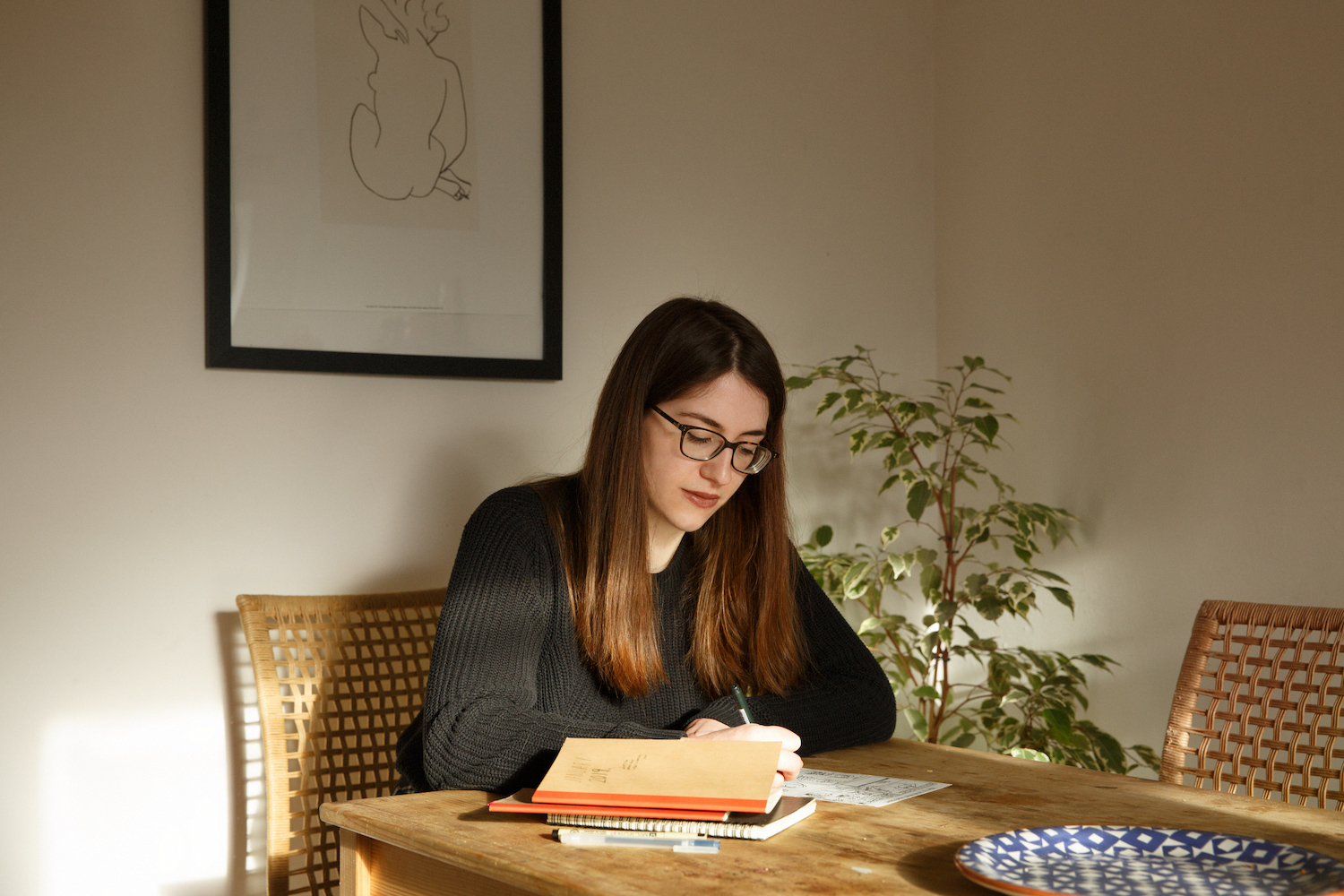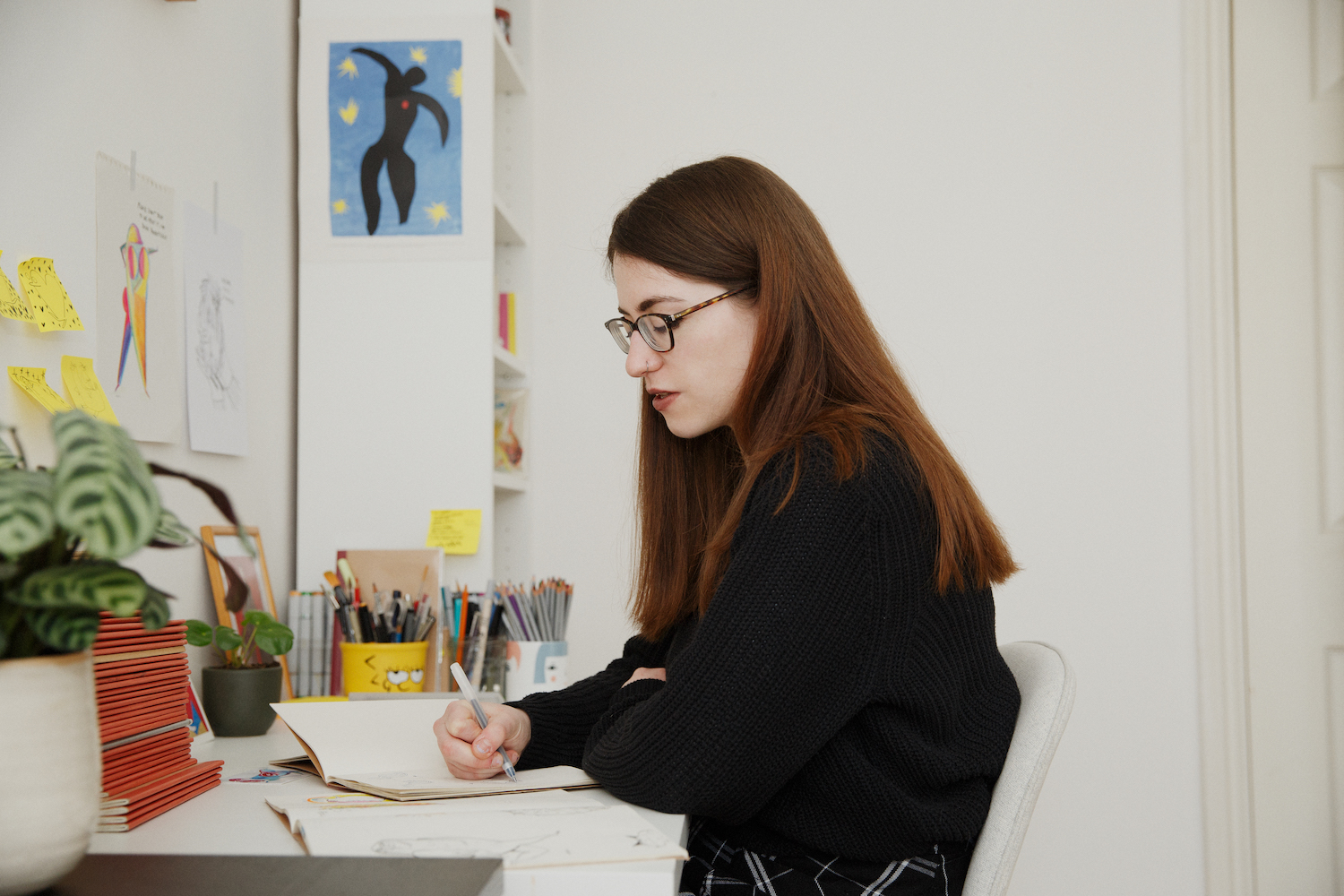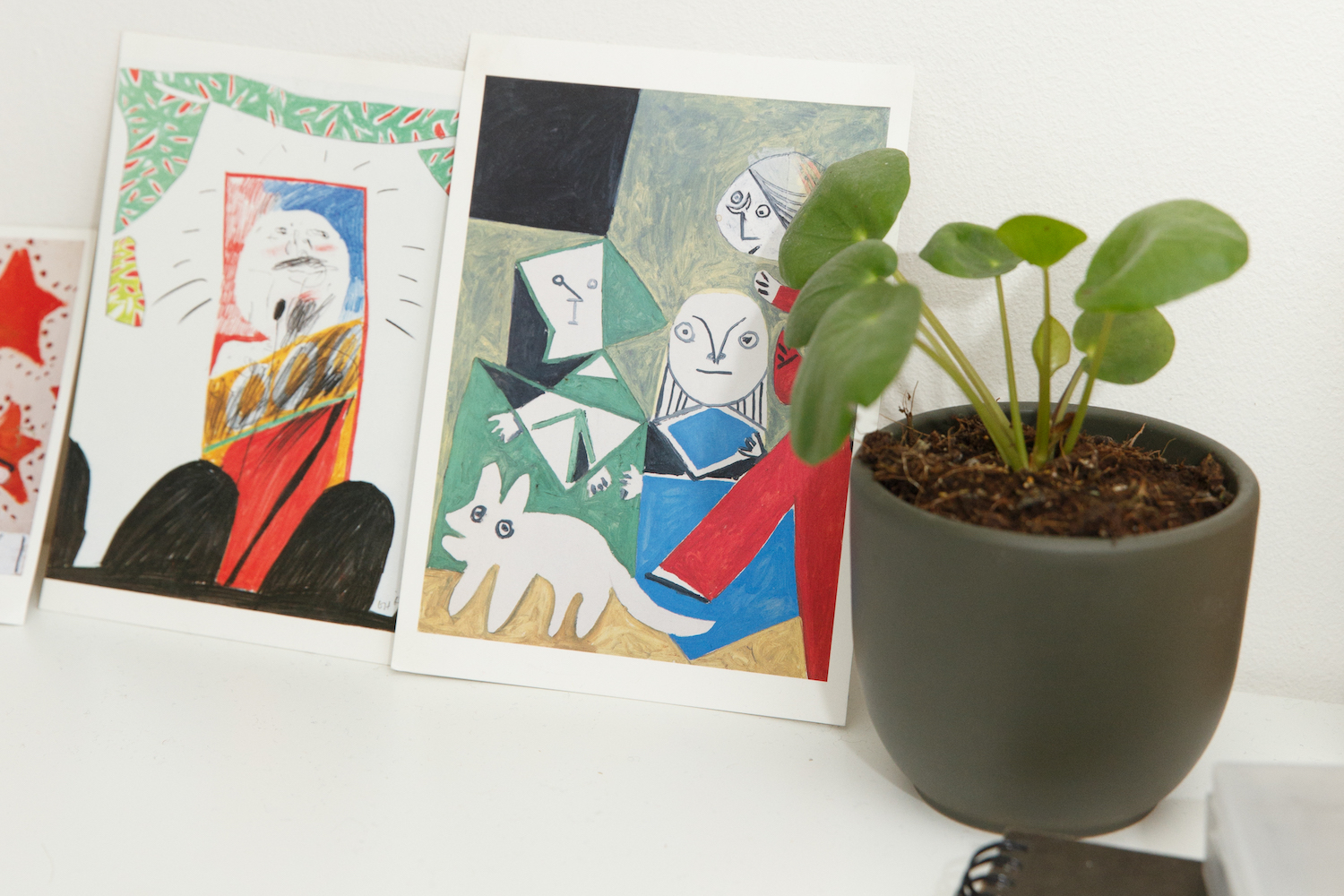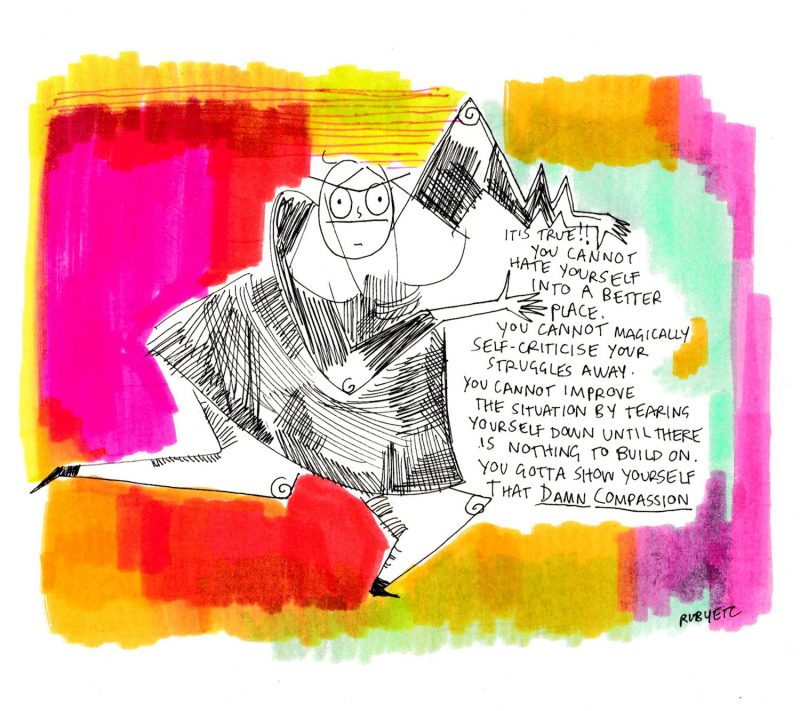It’s hard not to appreciate Ruby Elliot‘s sense of humor.
The London-based illustrator gives all of her subjects–covering everything from everyday life, tons of cute animals and mental health issues–a touch of her signature sharp wit. She began creating cartoons and drawings a few years ago as a way to cope with her own anxiety and depression and wants to normalize how people view and more importantly, talk about, mental health. Here, Ruby tells us all about the importance of keeping a good sketchbook, taking silliness seriously and eating lots of baked potatoes.

Hi Ruby! Can you tell us a little bit about yourself and what you’re up to?
Hello! I’m actually not great with introductions at all; I’ve often made up a different job for myself at parties because I am so bad at explaining what a freelance artist does. This is quite a good game until I realize that I am going to have to maintain a fictitious career as a marine biologist all night despite knowing very little marine biology.
But yes, I am a cartoonist, illustrator, author and artist(ish) living in London. I grew up here and like all Londoners I hate the city and love complaining about how much I hate the city and also think it is one of the best places on earth and become wildly defensive if anyone badmouths her.
At the moment I am working on some original commissions, researching bits for future comics along with pieces of writing and yesterday I walked 5 miles down a canal to avoid doing both of those things! That’s an appropriate description of freelancing, actually.
I really admire how candid and honest you are about your mental health–I’ve read you’ve suffered from anxiety, depression, bipolar disorder and several eating disorders. How have these experiences influenced your artistic practice, and conversely, has your practice helped you cope with any of these conditions?
Thank you very much. It’s funny you describe it as admirable because it’s always felt like a normal thing to do, to talk about your head. As an artist I am reluctant to be defined by illness or seen only as someone who draws and writes about mental health, because I did that for a bit and it would feel incredibly boring now. My experience of bipolar influences my practice in the same way anyone’s life experiences do, both feeding and impeding at different points.
Before art was my job, drawing functioned purely as a coping mechanism and way of expressing what I was unable to verbalize. Now that it’s accompanied by deadlines and emails and taxes and more emails I often struggle to square “productivity” (my least favorite word) with an honoring of my mental and physical health that I need in order to survive. It’s not that art is no longer therapeutic, but the line between drawing because I want to and drawing because there’s rent to pay is fuzzier and I have to think harder in order to retain the calming, grounding or cathartic elements of drawing.
Keeping a sketchbook is my one anchor for this. They are one of the only spaces I have where I can feel totally uninhibited and not weighed down by self-criticism or feelings of inadequacy, which renders them really precious objects. However, it’s important that I am never precious about the way I use them and I love recording things as they happen, whether that’s a load of words or anxious sketches the size of my thumb or a drawing of a horse wearing shoes for no reason. My sketchbooks are my external hard drives for my brain–everything and a lot of nonsense lives there.

“Treating [mental illness] with lightness and humor gave me some…control back. It was a positive and healthy way to get through at a time where I couldn’t ride the kale-wagon to mindfulness town.”
You’re also so open about this in a way that makes people laugh, which is such an achievement. I took a look at your book It’s All Absolutely Fine: Life Is Complicated So I’ve Drawn It Instead and absolutely lost it when I saw your drawing of someone saying, “I’ve been feeling sad since about 8am….7 years ago.” Can you speak to why humor is such a prominent aspect of your work and how it helps you with your own mental health?
Oh, thank you again! I grew up on a diet of Laurel and Hardy and Simpsons VHSes and humor was emotional currency in my household so it made sense to try and be as funny and silly as possible. Later on when I discovered comedians like Victoria Wood and cartoonists such as Posy Simmonds and Claire Bretécher it clicked that women were in fact the funniest people of all and that really caught me somewhere between my eyes and heart and brain. I take silliness very seriously and honestly, I just like laughing. You know the feeling of making someone laugh, or better still, sending a text and receiving a reply that says you’ve made them giggle somewhere embarrassing like on the bus or in an elevator? That has to be one the best (and possibly most smug) feelings ever.
So I think in terms of my own work whatever the subject matter happened to be I would have wanted to make it funny. Mental and chronic illness does have a tendency to suck all the joy out of your life and the lives of those around you, often leaving you hopeless with a sense that nothing is in your control. During the darkest points in my late teens I began to make silly pictures where I would poke fun at my psychiatrist, or maybe draw yogurt in the supermarket witnessing me having a panic attack. Treating these (often terrifying) experiences with lightness and humor gave me some of that control back. It was a positive and healthy way to get through at a time where I couldn’t ride the kale-wagon to mindfulness town. Not without a lot of laughing and cursing anyway.
On the flip side, have you ever had anyone think you’re reducing mental illness to a joke with your work? How do you respond to those comments?
I don’t get a lot of this, thankfully. I joke heavily about emotions and illness, and I don’t see that as reduction. I see that as an expression for something that is often so huge and abstract or scary we often don’t know how to talk about it at all, let alone find humor in it. Luckily I think the majority of my audience feels the same way. And in more general terms, I always say that hate or criticism of your work, although often unpleasant, is still positive; having provoked any emotion in someone with something you’ve made is a success. The worst response you can have to your work as an artist is total indifference. “Meh” is my nightmare.

“I am wary of commodifying our experiences for social media…of course talking openly can be a great release and help others to feel less alone, but no one should feel obligated to divulge difficult experiences on the internet.”
What mediums do you work with and how did you land on your signature style?
My style probably comes from drawing a lot of the same things for years on end and developing muscle memory for them, I think. The truth is that I have very little technical skill, but I’ve learned how to do bad drawings in a good way. When you draw with confidence and unapologetically people think your style is a deliberate choice rather than a product of necessity!
I also see a lot of animals in your works. Do you have any pets of your own, and if so, do they make an appearance in your drawings?
I do! Well, my dog Sadie lives with my family about half an hour away. We visit one another frequently. She is a sweet old lady with arthritis in her furry knees now, but has been appearing in my work since we brought her home as a puppy. She’s been the feature of so many drawings and should probably be on a royalty by now. (Please do not explain royalties to my dog.)
Aside from drawing, what other endeavors do you pursue to take care of yourself?
Music is a huge part of my day, and I’m a genre-hopper (who isn’t?). I listened to a fair amount of Riot Grrrl goodness at the end of last year (see: The Tuts, Le Tigre & Dream Nails) along with that new Grimes song that sounds like you should be walking in away in slow motion from something you’ve set on fire (“We Appreciate Power”) but I am starting 2019 a little milder. I’ve had Etta James and Aretha Franklin on this morning.
I also sing in a feminist women’s choir called Lips. We sing everything from Amy Winehouse to Kate Bush, Diana Ross, Sylvester and En Vogue and perform around London and beyond. I love the singing, but the supportive and loving community is what makes Lips so special. It’s self-care with a disco ball and sixty women belting “I’M COMING OUT.”
I got into yoga by accident when I had run out of energy to be cynical about yoga and it turned out to be a really nice way of looking after my brain and helping with migraines and neck pain. I also try and walk as much as I can because it’s good for me and run when I am feeling brave.
I am also trying to read more this year because I was very out of the habit. Making time to sit with just myself and a book is so comforting. I kick myself for forgetting this!
Any tips for steps others can take to care for their own mental health?
Ah, I don’t like giving too much broad advice but here is a drawing instead.

You have a large Instagram following, which can be a great way to get your work out into the world. Do you feel it is a responsibility to use your platform to talk openly about mental health and mental illnesses? And do you ever feel the need to unplug? Social media can be a double-edged sword!
I’ve never seen it as a responsibility particularly. I’m not a “warrior” or an advocate and I use social media for work. Like anyone, I have a responsibility to be considerate, not promote violence or hatred and generally not be an idiot online, but beyond that I don’t think anything is mandatory. I am wary of commodifying our experiences for social media, and when it comes to mental illness I’ve seen how the increased pressure to “speak out” and publicize your “journey” in a way that is both articulate and inspiring. It all has to be part of The Brand! That sort of vibe.
Of course talking openly can be a great release and help others to feel less alone, but no one should feel obligated to divulge difficult experiences on the internet. When I’m in the throes of a bad episode it’s better for me to put my phone down, go to friends and family and try and make sense of it together in person rather than yell stuff into the void, which I have done in the past and it’s made things worse.
So you’ve released your first book and have made numerous illustrations The New Yorker! Any exciting new projects or collaborations in the works?
I have collaborations in the works that I have to keep secret for now! And I am currently researching other writing projects that I will also keep secret in case they go wrong. I did a lot of new talks and workshops in 2018 and I’d love to explore that avenue more. But I’m also resting and taking lots of time to survive and eat baked potatoes at the moment. I was going to justify that with more words but actually no one should have to justify surviving. Or indeed baked potatoes.
Photos by Stephanie Alcaino
Comments